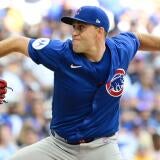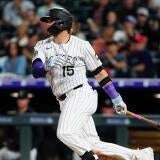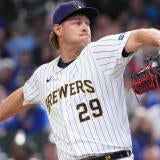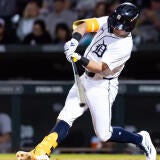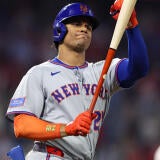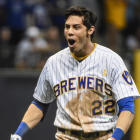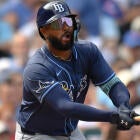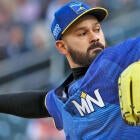The 10 biggest questions for Fantasy baseball as MLB gets set for 2020 return
MLB announced Monday a return-to-action plan that would see a 60-game season take place for 2020. Here are the biggest questions for Fantasy players to answer
Negotiations are over between Major Baseball and the Major League Player's Association, with MLB sending a letter to the players Monday evening essentially telling them to get ready for the 2020 season. Hurdles remain to be clear — players have to agree to report to training by July 1 and agree to the safety protocols the two sides have been negotiating — but assuming that happens, baseball is back for 2020 after what will end up being a nearly four-month absence due to the COVID-19 pandemic.
Here are the 10 biggest questions Fantasy players need answered about the latest turn in this saga, and my best effort to answer them based on what we know. It's okay to get excited.
We talked about the latest news in an emergency episode of the Fantasy Baseball Today podcast Monday night, which you can listen to below, and be sure to subscribe for non-stop Fantasy baseball content:
1) Will there be a season in 2020?
There are a few hurdles left, but it seems like we will, unless the players don't agree with the safety protocols. At this point, you never want to say anything is certain, but it's hard to imagine the season will get tripped up over the part of the negotiation that has seemed least acrimonious.
2) When will it start?
If the MLBPA signs off, "spring" training will begin July 1, with the season expected to begin July 25 or 26.
3) How long will it be?
60 games. That was MLB's latest proposal, and even after the players turned it down, MLB appears to have opted to stick with it. That July 25th start date, combined with the Sept. 27 end date that has been a pretty consistent part of MLB's negotiations from the start, leaves us with 65 days to play 60 games.
4) How different will the game look on the field?
That means there won't be that condensed schedule like we thought in the early stages of the negotiations, so some of the concerns about totally different usage patterns for players are gone. Teams will likely stick with five-man rotations, and while they may be more aggressive in pulling struggling starters, those aren't exactly the kind of players you want in your Fantasy rotation for long anyways.
In all likelihood, this will probably look like a normal baseball season, just shorter and weirder. We'll see deeper rosters, which perhaps could lead to more early hooks for pitchers early on in the schedule given the shorter amount of time to get back up to speed before games pick up. We could also see more platooning for hitters given the roster flexibility. I would also expect more injuries than usual, especially early on, given the start-and-stop nature of players' preparation so far. With pitchers always at greater risk for injuries, that is a real concern.
Of course, the biggest unknown in all of this is the reason we're in this situation in the first place: COVID-19. Reportedly, both sides felt additional pressure in recent days as a slew of teams had to shut down their de facto training camps due to concerns about spread, both within their facilities and in the areas around them, which just highlights how much of an impact Coronavirus is still likely to have. No matter what the safety protocol is, this is going to loom over the league as a whole.
One thing worth noting that could have a significant impact for Fantasy baseball: The universal DH. That won't impact the American League much, but National League teams will have an extra lineup spot to play with, creating the potential for the likes of Howie Kendrick, Justin Smoak, and Dylan Carlson, among others. That would also, obviously, have a negative effect on NL pitchers, who will go from facing pitchers in the nine spot to position players.
5) What will it mean for prospects?
There won't be a minor-league season, but there might be taxi squads teams can bring along with them to participate in workouts and call up if needed. There have been discussions about a 20-man taxi squad, though that was back in the days when a condensed season might have necessitated it, so what the rosters look like beyond the active one remains to be seen. Expect every player on each team's 40-man roster to see playing time this season, which means prospects on those 40-man rosters should have a better chance to make an impact.
But what about the rest of the top prospects Given that the team owners have spent the last few months trying to wring every monetary concession they could out of players, are they really going to start the service time clock on the likes of Wander Franco, Mackenzie Gore, or Nate Pearson in a short season? Especially we saw them mess with service time for studs like Ronald Acuña and Vladimir Guerrero? I'd like to think they will prioritize development over dollars, but it might just be wishful thinking. That extra year of arbitration or contract control might have value, but so does sacrificing a full season of reps for the players who need them most. Add in the expanded postseason and the likelihood that some teams will unexpectedly struggle while others make runs in a shortened season, and there may be more incentive to call young guys up and field the best roster possible, service time be damned.
It might be naive, but a guy can dream, at least.
6) What does it mean for Fantasy baseball?
Well, first and foremost, it means we can play Fantasy baseball, which is great news. It's not a 162-game season, or even a 110-game season like we had initially hoped for, but it's something. It's going to be a little more than nine weeks of baseball, which is enough to sneak in a Fantasy season, though it won't be what you're used to.
For example, it probably doesn't make much sense to play in high stakes leagues this year. There will just be way too much variance in performance. We talk all of the time about the unreliability of stats in small samples, but a 162-game season allows you to ride that roller coaster to somewhere close to ground level.
A 60-ish game season is all roller coaster. Scott White took a look at how the expectation of a shortened season has changed ADP last week.
7) How should my strategy for Fantasy change?
The thing about a shorter season is, while we know there will be more variance, it is impossible to know which players will be most affected, or what those effects will be. I've spent the last week or so trying to visualize what that increased variance will mean, and I wrote about it last week here.
One key for me will be pushing pitchers as a whole down my draft board. Their performance is more prone to random variance from one season to the next than hitters' already, and that's when they are making 30-plus starts, not 10-12. Pitching will be harder to predict than ever in 2020, and that's without accounting for the likely increased injury risk across the board. Prioritize hitters to get the best return on your investment.
I'm not sure pitcher rankings should change much relative to one another — Gerrit Cole is still the top guy — but I can see the case for moving certain pitchers up. Such as those guys we expect to be really good, but had workload concerns. Julio Urias and Jesus Luzardo were never going to throw 200 innings; they should be able to throw 80.
As for what that performance may look like, it helps to visualize what might happen. Matthew Boyd might highlight that randomness more than any other pitcher, as you can see below, based on snippets of 50-game performance from 2019:
Matthew Boyd:
— Chris Towers (@CTowersCBS) June 9, 2020
Could be the best pitcher in baseball!
Could be the worst pitcher in baseball! https://t.co/eYuoI4QBXb pic.twitter.com/rUcqbJi3lk
It's not just pitchers who will be prone to variance, either:
It's also fun to compare Christian Yelich's potential range of outcomes to Cody Bellinger's. Both could hit .400 in a shortened, but Yelich's skill set seems to be more stable. pic.twitter.com/Itc1ZM5KSC
— Chris Towers (@CTowersCBS) June 9, 2020
You can try to target certain skill sets that are more stable — low strikeout rates for hitters would be a good one — but good luck figuring out which players will get good luck and which will get bad luck. Leave your hitter ranks unchanged.
A 60-game season season would allow a bit more time for things to settle than the 50-game one this analysis was based on, but it would still lead to outlier performances all across the league. That randomness can be fun, but it's also going to make projecting all this even tougher.
8) What should I change about my league to account for the schedule?
If you play in a Rotisserie league, maybe nothing. The sample is smaller and won't reward the best team as consistently as it would in a normal season, but a 10-week Roto sprint might actually keep everyone in the league in the hunt right through to the end, which has its own positives.
Those of you in H2H leagues will have to get creative. You can switch to a total points format for the season, but that's basically just Roto with different stats. A tweak on that is having every team in the league play against each other every week, with your total records determining either the winner after 10 weeks, or your playoffs after seven or eight.
You could also do multiple matchups every week to simulate a full season. A seven-week regular season with three matchups for every team comes out to the same number of matchups as a 21-week regular season, so that certainly works. You could then do a two-week, four-team playoff to determine the champion.
9) Is it even worth playing in a nine-week season?
A lot of Fantasy baseball purists turn their nose up at the randomness inherent in the 13- to 14-game regular seasons of Fantasy football. This is half that. What's the point?
The point is the same as every time you play Fantasy baseball: To have fun, compete, and stay engaged with the sport. Don't be a grouch!
10) What does it mean for 2021 and beyond?
We won't have to throw 2020 results entirely out, but ... we might as well. 60 games just isn't enough to say for sure whether a skill change has really occurred for most skills, so an especially good or bad 2020 shouldn't change your opinion about a player too much.
We'll probably end up overreacting to what happens in 2020 no matter what, because it's just more fun that way. But the most fun thing is, at this point, it looks like we'll actually have a season to overreact to.

